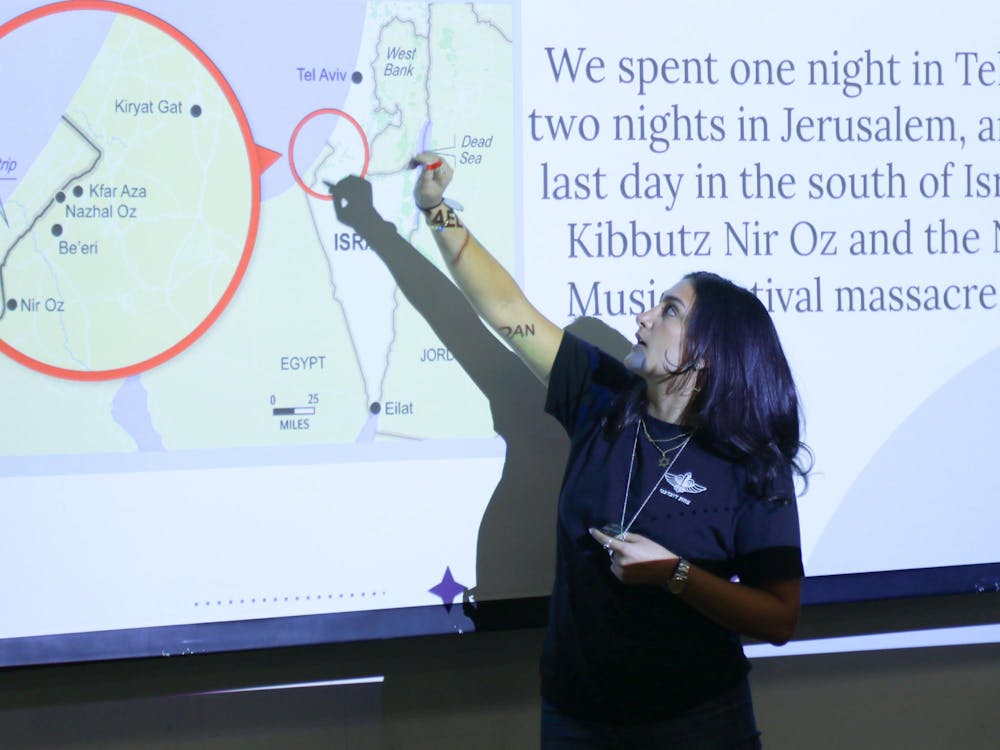Nineteen students convened Tuesday evening to share stories from a four-day solidarity trip to Israel sponsored by the national organization Chabad on Campus.
The event, titled “Israel: Beyond the Headlines,” sought to highlight the stories of “survival, hope and resilience” the students encountered in their conversations with survivors of the Oct. 7 Hamas-led attacks. Senior Nicole Schwenk said that the goal of the trip was to “listen to the stories and better understand what happened on October 7th.”
The group of students raised over $46,000 to distribute food and toys to displaced families and donate to nonprofit organizations supporting injured Israeli veterans.
Each student brought a duffel bag full of toys to hotels housing displaced Israeli families. The students recalled “hundreds of kids” running down from their hotel rooms for the toys.
During the trip, the students attended the Nova Festival Site, where Hamas militants killed 364 Israeli civilians and took 40 hostages at a music festival.
“I was shaking … we were walking on the same ground they were on,” one student recounted.
The students met with a survivor who was returning to the festival site for a fourth time to spread awareness about his experience. The survivor conveyed his gratitude that a group of college-aged students had come to Israel with the goal of listening to victims’ stories.
During the trip, the students met an Israeli woman, Jessica Elter, who shared with the students how Hamas militants killed her boyfriend, Ben Shimoni, while he was driving to and from the Nova Festival Site to help people escape.
Elter told the students that Shimoni saved nine people before being killed on his third trip.
In addition to meeting with Israelis affected by the attacks, the students visited Tel Aviv, Jerusalem and a number of small agricultural collectives known as kibbutzim along the Gaza Strip. Hamas militants targeted many of these communities on Oct. 7, killing residents and taking hostages.
Students shared photos from a kibbutz called Nir Oz.
“I wish I could say it was the set of a horror movie, because that’s what it looked like,” one student explained. “Unfortunately, this is exactly how everything was left the night of October 6th and the morning of October 7th.”
The students showed photos of homes in Nir Oz that were burnt down and destroyed pottery and safe rooms covered in ash.
Students also showed a photo of a wall of mailboxes covered with several dozen red and black stickers — according to them, the red stickers represent a family member who was killed, while the black stickers represent a family member who has been taken hostage.
The students described being moved by the story of a woman from Nir Oz who was kidnapped Oct. 7 from a safe room in her home and held hostage by Hamas for 54 days. After being released, she learned that her husband was killed in the attack.
She returned to her home just days before Nir Oz held an event spreading awareness about the hostages taken from their community. Despite the recency of her capture, the woman got on stage and recounted her experience being held hostage.
The students also shared how they were moved by the effects of war on the everyday lives of Israelis.
The trip attendees visited Sderot, a city with a playground in its center. The playground featured a large tunnel painted like a caterpillar, which doubled as a bomb shelter.
“You have 12 seconds when sirens go off to find refuge,” senior Becca Zeltsman said. “Because of how many rockets they receive on a daily basis, they needed something in the center of the city that gave kids the opportunity to hide and play at the same time.”
Students recounted seeing a large menorah art piece in front of the Chabad Center of Sderot, explaining that the candles were made out of rockets that had struck the city.
Get The Chronicle straight to your inbox
Sign up for our weekly newsletter. Cancel at any time.
Senior Alanna Peykar spoke about the gravity of hearing stories from families affected by the attacks, describing that her experience ranged from devastation at the attacks to rejuvenation upon providing support to those she met.
“We felt every single emotion possible,” Peykar said.

Michael Austin is a Trinity junior and managing editor of The Chronicle's 120th volume.

